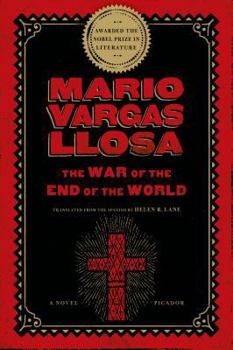La guerra del fin del mundo
Select Format
Select Condition 
Book Overview
Customer Reviews
Rated 5 starsTHE WORLD IS COMING TO AN END!!!
This is perhaps Vargas Llosa's best novel and a must for all those well-meaning readers in the developed world who eagerly idealize Latin American revolutions without knowing anything about these countries.The book is based on the true story of Antonio Vicente Mendes Maciel ("O Conselheiro"), a mad prophet of sorts -kind of a weird Christian ayatollah of the late XIX Century- who ignited, in the most remote corner of Brazil,...
3Report
Rated 5 starsTHE WORLD IS COMING TO AN END!!!
This is perhaps Vargas Llosa's best novel and a must for all those well-meaning readers in the developed world who eagerly idealize Latin American revolutions without knowing anything about these countries.The book is based on the true story of Antonio Vicente Mendes Maciel ("O Conselheiro"), a mad prophet of sorts -kind of a weird Christian ayatollah of the late XIX Century- who ignited, in the most remote corner of Brazil,...
0Report
Rated 5 starsFanatismo Religioso o Intolerancia Humana?
A través de esta novela Mario Vargas Llosa nos regala una historia real cubierta de fantasias tan bien entretejidas que facilita una lectura fluída que nos hace sostener la última expiración en cada capítulo siguiente esperando que no sea el último.El personaje principal es El Consejero, un asceta que recorre todos los pueblos predicando la palabra de Dios y sin haberlo planificado se encuentra dentro de una multitud que veía...
0Report
Rated 5 starsThe greatest 19th Century novel written in the 20th Century
The War of the End of the World is an impossibly ambitious book which nevertheless succeeds completely, and in the process confirms that Vargas Llosa deserves to be considered among the great authors of all time. Unlike his other books, which are either frankly autobiographical or significantly based on the author's personal experience, this is a straightforward historical novel, taking place in 1890s northeastern Brazil...
0Report













